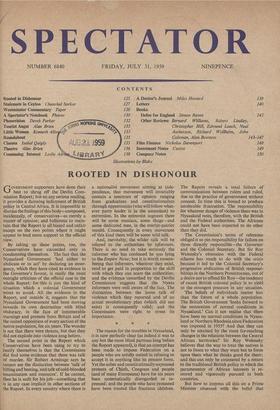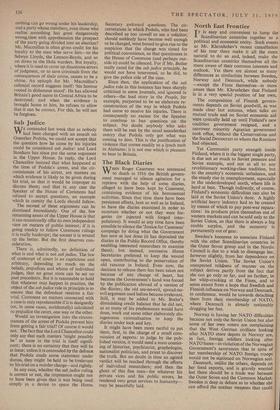ROOTED IN DISHONOUR
GOVERNMENT supporters have done their best to shrug off the Devlin Com- mission Report; but on any serious reading, it provides a damning indictment of British policy in Central Africa. It is impossible to dismiss the findings of this body—composed, incidentally, of conservatives—as merely a matter of opinion; and ludicrous to main- tain that the Report is all biased and unfair except on the two points where it might appear to lend some support to the official view.
By taking up these points, too, the Conservatives have succeeded only in condemning themselves. The fact that the Nyasaland Government 'had either to abdicate or to act' by declaring an emer- gency, which they have cited as evidence in the Governor's favour, is really the most outright criticism of the official case in the whole Report: for this is just the kind of situation which a colonial Government exists to avoid. All the evidence in the Report, and outside it, suggests that the Nyasaland Government had been moving towards its own destruction with blind obduracy, in the face of innumerable warnings and protests from Britain and of the united opposition of every section of the native population, for six years. The wonder is not that there were threats, but that they did not explode into violence long before.
The second point in the Report which Conservatives have been using to try to justify themselves is that the Commission did find some evidence that there was talk of murder. Sir Robert Armitage says he cannot see the distinction between 'talk of killing and beating, and talk of cold-blooded assassination and massacre'. If he cannot, then he is unfit for his job—something that is in any case implicit in other sections of the Report. In every country where there is a nationalist movement aiming at inde- pendence, that movement will invariably contain a spectrum of opinion ranging from gradualists and constitutionalists through opportunists (who will follow what- ever party leader is in the ascendant) to extremists. In the extremist segment there will be some maniacs, some thugs—and some dedicated men, in the martyr-patriot mould. Consequently in every movement of this kind there will be some wild talk.
And, inevitably, the wilder talk will be relayed to the authorities by informers. There is no need to take seriously the informer who has confessed he was lying to the Empire News; but it is worth remem- bering that informers, wherever they exist, tend to get paid in proportion to the skill with which they can scare the authorities; and the evidence unearthed by the Devlin Commission suggests that the Nyasa informers were well aware of the fact. The distinction between the loose talk of violence which they reported and of an actual revolutionary plan (which did not exist) is consequently valid; and the Commission were right to stress its importance.
The reason for the troubles in Nyasaland, it is now perfectly clear (as indeed it was to any but the most blind partisan long before the Report appeared), is that an attempt has been made to impose Federation on a people who are solidly united in refusing to accept it in anything like its present form. Yet the sober and constitutionally-expressed protests of Chiefs, Congress and people (and of many Europeans) have for six years been systematically disregarded or re- pressed; and the people who have protested have been treated like fractious children. The Report reveals a total failure of communication between rulers and ruled, due to the practice of government without consent. In time this is bound to produce intolerable frustration. The responsibility for whatever danger of violence there was in Nyasaland rests, therefore, with the British and the Federal authorities. The Africans could not have been expected to do other than they did.
The Commission's terms of reference obliged it to pin responsibility for failure on those directly responsible—the Governor and the Colonial Secretary. But Sir Roy Welensky's obsession with the Federal scheme has much to do with the crisis because it led to the Colonial Secretary's progressive abdication of British responsi- bilities in the Northern Protectorates, out of a desire not to offend Sir Roy—the tendency of recent British colonial policy is to yield to the strongest pressure in any situation.
The beliefs of individuals matter less than the future of a whole population. The British Government 'looks forward to the restoration of normal conditions in Nyasaland.' Can it not realise that there have been no normal conditions in Nyasa- land or Northern Rhodesia since Federation was imposed in 1953? And that they can only be attained by the most far-reaching changes in the relations between the Central African territories? Sir Roy Welensky believes that the way to treat the natives is not to listen to what they want but to force upon them what he thinks good for them; and this can only be countered by a return to the traditional British policy in which the paramountcy of African interests is re- stored and vigorously pursued in both countries.
But how to impress all this on a Prime Minister obsessed with the belief that nothing can go wrong under his leadership, and a party whose members, even those who realise something has gone dangerously wrong,view with apprehension the prospect of the party going divided into an election? Mr. Macmillan is often given credit for his loyalty to the men who serve him—to the Selwyn Lloyds, the Lennox-Boyds, and so on down to the Hola warders. But loyalty, where it is used to cover up disastrous errors of judgment, or to save criminals from the consequences of their crime, ceases to be a virtue. An epitaph for Mr. Macmillan's colonial record suggests itself: 'his honour rooted in dishonour stood'. He has allowed Britain's good name in Central Africa to be destroyed; and when the evidence is brought home to him, he refuses to allow that it can be correct. For this, he will not be forgiven.































